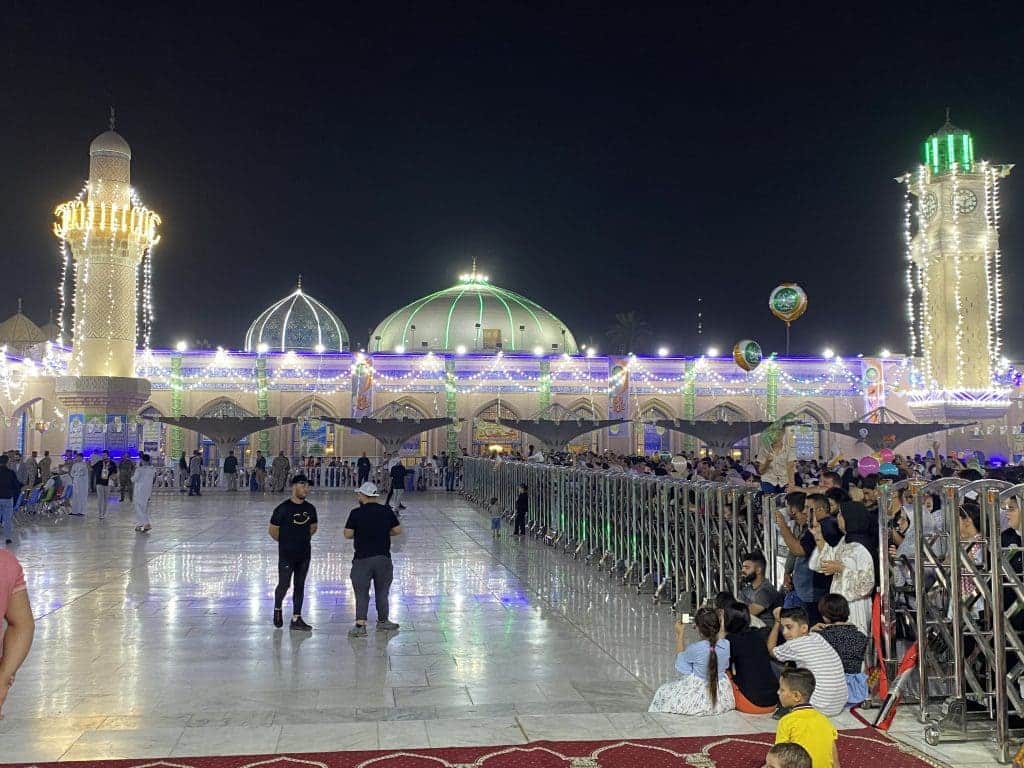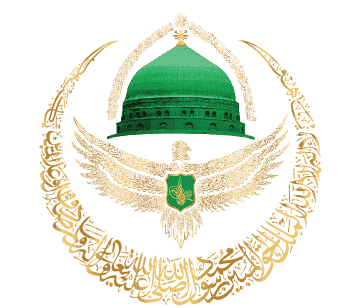What is the Tariqa?
Prominent Figures of the Qadiri Kasnazani Tariqa
Benefits of the Tariqa and How to Join
The Tariqa offers profound benefits for both the soul and the body. Its primary goal is to purify the self, attaining spiritual purity and perfection. It serves as a pathway for healing spiritual, psychological, and even physical ailments. Allah Almighty says in the Qur’an:
“He has succeeded who purifies it [the soul].” (Ash-Shams: 9)
The Tariqa helps individuals break free from the noise and burdens of daily life, allowing them to experience divine light and blessings. This light, naturally present in humans from childhood, diminishes due to sins and negative deeds. By following the path of the Tariqa and repenting, one can revive this light within their heart.
Joining the Tariqa involves pledging allegiance (Bay’ah) with the Sheikh. This pledge symbolizes one’s covenant and submission to Allah Almighty and His noble Messenger (peace and blessings be upon him and his family). As stated in the Qur’an:
“Indeed, those who pledge allegiance to you [O Prophet]—they are actually pledging allegiance to Allah. The Hand of Allah is over their hands.” (Al-Fath: 10)
During the bay’ah, the seeker places their hand in the hand of the Sheikh, receiving blessings and guidance through this sacred act.
The Message of the Qadiri Kasnazani Tariqa
The message of this Tariqa is rooted in the teachings of the Holy Qur’an and the Sunnah of the noble Prophet (peace and blessings be upon him and his family). It promotes moral values such as compassion, honesty, humility, and patience. The path extends beyond invocations and worship to encompass ethical living, inner reflection, and helping others.
Many verses and hadiths point to these teachings, including:
- “And indeed, you are of a great moral character” (Al-Qalam: 4), which highlights the sublime character of the Prophet.
- “And you became, by His favor, brothers” (Aal-E-Imran: 103), which emphasizes the importance of brotherhood and unity.
- The hadith: “I was sent to perfect good character,” which underscores the central role of ethics in Islam.
- Another hadith: “The best of you are those who learn the Qur’an and teach it,” which stresses the importance of learning and teaching the Qur’an.
The Tariqa aims to guide its followers toward a life of morality, humanity, and remembrance of Allah, striving to foster both spiritual and social growth.
Rituals of the Qadiri Kasnazani Tariqa
The rituals of the Qadiri Kasnazani Tariqa comprise a set of etiquettes and spiritual practices aimed at purifying the heart from negative traits, drawing closer to Allah Almighty, and enhancing the spiritual ascent of its followers. These rituals are deeply rooted in the principles of Sufism and are inspired by the teachings of Islam.
Key Rituals of the Qadiri Kasnazani Tariqa:
Dhikr (Remembrance):
The repetition of the Names of Allah or sacred phrases such as “Allah” and “Ya Hay, Ya Wahid,” aimed at focusing on the Divine Essence, purifying the heart, and strengthening the spiritual connection with Allah Almighty.
Sama (Listening):
Attentive listening to Sufi music and mystical poetry with the intention of enhancing love for Allah and attaining spiritual states. This practice helps achieve inner tranquility and fosters a deeper connection with the Divine Essence.
Spiritual Seclusion (Khalwa):
Temporary isolation for worship, reflection, and self-purification. Khalwa provides individuals the opportunity to unlock their spiritual depths and attain a profound understanding of Divine existence. Details of this practice can be found in the “Spiritual Seclusion” section.
The Khanqah (Takya):
A gathering place for Sufis where they perform collective worship and dhikr. The Khanqah serves as a sacred space and a center for teaching and spreading spiritual and mystical concepts.
The Relationship Between the Seeker and the Sheikh:
A deep spiritual bond between the seeker (Murid) and the Sheikh of the Tariqa. The Sheikh acts as a guide, directing the seeker along the path of spiritual growth and providing teachings and mentorship.
Dhikr Circles (Gatherings of Remembrance):
Group gatherings for performing collective dhikr, which enhance spiritual presence and attract Divine mercy. Collective dhikr is a fundamental practice in the Qadiri Kasnazani Tariqa, aiding in the acceptance of prayers and multiplying Divine blessings.
The Impact of Collective Dhikr on Divine Mercy
Invitation to Attend Collective Dhikr Gatherings:
By joining the Qadiri Kasnazani Tariqa and participating in the weekly dhikr gatherings, you can benefit from Divine blessings and experience profound spiritual presence in your life. If you are interested in attending these spiritual assemblies, please contact us through the “Contact Us” section and provide your contact information and location.
The Spiritual Guide or Sheikh
All mystical traditions emphasize that spiritual growth and igniting the flame of Divine love in a person’s heart require the guidance of a spiritual mentor.
Islamic Sufism, one of the highest branches of mysticism, has drawn countless followers worldwide, thanks to its esteemed figures such as Hasan al-Basri, Junayd al-Baghdadi, and Abdul Qadir Jilani. These iconic personalities highlight the superiority of Islamic Sufism compared to other schools of mysticism.
The Role of the Sheikh in Spiritual Nurturing
In verse 129 of Surah Al-Baqarah, Prophet Ibrahim (peace be upon him) prayed:
“Our Lord, and raise up in them a Messenger from among them who will recite to them Your verses, teach them the Book and Wisdom, and purify them.”
The phrase “teach them the Book and Wisdom” refers to teaching the Qur’anic verses and Shariah, while the term “purify them” indicates the purification of the soul and the cleansing of the heart. This purification cannot be achieved through knowledge alone; it requires an external spiritual force, embodied by the Sheikh in Sufism.
In Sufism, there are two dimensions to purification:
- The Knowledge of Purification: The intellectual understanding of purification, as explained in the Shariah.
- The State of Purification: The heartfelt and spiritual experience realized through the Tariqa.
For instance, Divine knowledge derived from the Shariah represents the mind’s perception of God, while Divine love, cultivated in the Tariqa, represents the heart’s perception of God. Transforming knowledge into love is akin to a chemical reaction that requires a catalyst. In Islamic mysticism, the Sheikh serves as this catalyst, facilitating the transformation of intellectual understanding into profound spiritual love.
An Example of the Sheikh’s Impact: The Story of Jalal al-Din Rumi
Before joining the Sufi path, Jalal al-Din Rumi was one of the most prominent scholars of his time. He issued fatwas in all four schools of Islamic jurisprudence, taught the Qur’an, and had hundreds of disciples. He performed nightly prayers and fulfilled all acts of worship. If asked, “Do you love Allah?” he would undoubtedly respond, “Absolutely.” Yet, his divine knowledge remained confined to his intellect, and he had not experienced divine love in his heart.
Everything changed when Shams al-Tabrizi entered his life. Shams, who appeared outwardly less learned than Rumi, played the role of a Sufi guide. In a single encounter, Shams transformed the divine knowledge in Rumi’s mind into divine love in his heart. This transformation elevated Rumi from a dignified scholar to a passionate lover. He described this profound shift himself, saying:
“Dead yet I was, then came to life, weeping I was, then came to laugh
Love’s kingdom came, I came to be, the kingdom of eternity”
The Divine Hue: A New Life with the Tariqa
The work of the Sheikh resembles that of an artist who transforms a person’s life from black and white into a vibrant, colorful masterpiece. As Allah says in Surah Al-Baqarah (138):
“The coloring of Allah, and who is better than Allah in coloring?”
Similarly, Hafiz Shirazi, the great mystic. highlights the impossibility of reaching divine love without a guide, saying:
“On the path of love, do not take a step without a guide;
for I tried a hundred times on my own and failed.”
For this reason, as emphasized by Islamic mystics, having a Sheikh is essential for attaining divine love and closeness to Allah. The Sheikh acts as a catalyst, helping seekers awaken their hearts and transform their spiritual journey.
The Sheikh of the Tariqa: The Spiritual Guide in the Path of Sufism
The Sheikh of the Tariqa, or the spiritual guide, plays a pivotal role in igniting the flame of divine love in the hearts of seekers. This role goes beyond theoretical and religious knowledge, encompassing unique spiritual and divine capabilities that enable the Sheikh to lead disciples on their spiritual journey.
The Role and Qualities of the Sheikh of the Tariqa
The Sheikh possesses spiritual powers that set him apart from others, including the ability to assist people from a distance. In Sufism, such individuals are referred to as “Ghawth” (the Helper). The Qur’an highlights the extraordinary power of one of Allah’s saints, Asif ibn Barkhiyya, who brought the throne of Queen Bilqis before Prophet Solomon (peace be upon him) in the blink of an eye (Surah An-Naml: 40). This example illustrates the profound abilities granted by Allah to some of His righteous servants.
The Power of the Ghawth and the Sheikh of the Tariqa
His Eminence Sultan Muhammad Al-Muhammad Al-Kasnazan, may Allah sanctify his secret, describes the abilities of the Ghawth and the Sheikh of the Tariqa:
“The Sheikh of the Tariqa possesses a power that surpasses that of ordinary humans. This power reaches its peak in the Ghawth, who becomes united with divine light and is able to aid those in need, even from afar. The Ghawth is close to Allah’s will, his prayers are answered, and he hears the call of those in distress, helping them through the power of Allah.”
The Rank of Al-Ghawth Al-Azam (The Supreme Helper)

The Status of the Qadiri Tariqa in Islamic Sufism
While many Sufi orders exist, most trace their roots to a few primary sources, including the Qadiri Tariqa. This Tariqa is distinct for its direct connection to His Eminence Abdul Qadir Jilani, may Allah sanctify his secret. Through its Bay’a (spiritual pledge), the Qadiri Tariqa transmits the Muhammadian light, offering seekers not only a spiritual path but also a direct link to divine blessings.
Scholars’ Praise for His Eminence Abdul Qadir Jilani
The renowned mystic Jami referred to Abdul Qadir Jilani as “King of Saints of Allah.”
Sheikh Muhammad Naqshband, founder of the Naqshbandi Tariqa, said in his praise:
“The King of the worlds is King Abdul Qadir,
The Lord of the sons of Adam is King Abdul Qadir.
The sun, the moon, the Throne, the Chair, and the Pen,
The light of hearts from the Great Light is King Abdul Qadir.”
The Noble Lineage of His Eminence Abdul Qadir Jilani
His lineage from his father traces back to Imam al-Hasan (peace be upon him), while his maternal lineage connects to Imam al-Hussein (peace be upon him). This noble heritage reflects his authenticity and close connection to the Ahl al-Bayt (peace be upon them).
The Qadiri Tariqa, deeply rooted in the history of Sufism, focuses on divine love and knowledge, offering a path of spiritual elevation and closeness to Allah. The Sheikhs of this order, as intermediaries of divine grace, play a unique role in guiding people spiritually.
